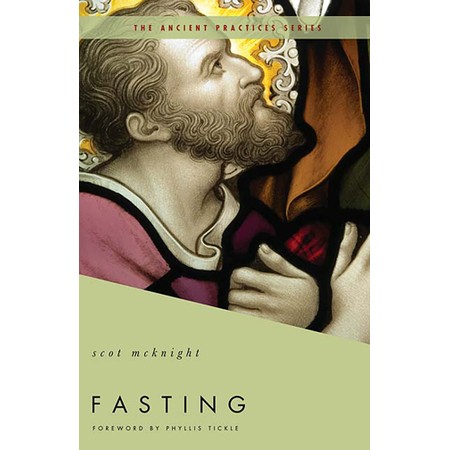Fast When You Hunger for God

Editor's Note: The following is a report on the practical applications of Scot McKnight's new book, Fasting: The Ancient Practices, (Thomas Nelson, 2009).
The ancient practice of fasting is a natural way to express your faith with your whole being – body and spirit together – whenever you experience a sacred moment that compels you to respond. Your spirit's hunger for God can find fulfillment when you fast with your body.
Here's how you can respond to your hunger for God through fasting:
View fasting as a response instead of a request. Don’t use fasting as a way to try to get the results you want from your prayers. Adding fasting to your requests to God when you want to convince Him to answer your prayers in a certain way amounts to using fasting as a manipulative tool. Instead of fasting to try to get God to respond to you, fast to respond to God. When you notice God at work in a special way in your life, you can express your awe, gratitude, and love back to Him by fasting. In the process, you may experience God’s presence on a deeper level. But fasting doesn’t guarantee any particular results. Fasting is simply a natural, inevitable response of a person to a grievous sacred moment in life – a moment when focusing on the physical pleasures of eating pales in comparison to focusing on the spiritual reality you’re encountering. Rather than fasting for what you can get from God, fast for what you can give to God. Fasting is simply a way of worshipping Him.
Embrace a healthy body image. Reject the dualistic way of thinking about people’s bodies that’s so popular in our culture. Your body and spirit aren’t two separate entities; they’re united as one whole. When you understand the profound connections between your body and spirit, it will become natural for you to respond to spiritual experiences by doing something physical like fasting.
Distinguish between fasting and abstinence. Fasting means not eating food (and sometimes not drinking) for a period of time (usually not more than 12 hours) in order to respond to a moment so sacred that indulging in food or drink would profane it. While some people say that they’re fasting when giving up something besides all food – like watching TV, having sex, or eating a specific kind of food, such as chocolate – for a while, that’s really abstinence, not fasting. Fasting is a more complete expression of devotion to God that can free you to focus your attention better on God.
Repent through fasting. Empathize with God’s grief over your sins by fasting. Engage your entire person in repentance by using your body to turn away from self-indulgence and toward God. At church, schedule some times to fast with others for group repentance, just as you all sometimes gather to feast together in celebration (at church parties, potluck dinners, etc.). Express your personal repentance through fasting at times like during Lent and Holy Week, when God seems absent from your life, and when you realize your own complicity in society’s moral wrongs.
Plea through fasting. While keeping mind that fasting isn’t a manipulative tool to add to your prayer requests, you can still fast to give yourself wholly to God when you’re pleading for something or someone. Fast when you find a particular condition intolerable, and you can’t be satisfied until you spend time with God expressing your concerns about it.
Grieve through fasting. Consider fasting when someone dies as a way of expressing your respect for that person and your pain at losing him or her. If eating seems sacrilegious at the time, fast for a while.
Discipline your body through fasting. When you become especially aware of your own sins and weaknesses and your resulting need for God’s grace, consider fasting as a way to learn discipline that will help you grow. If you discipline your body through fasting, your spirit will follow, and you’ll grow closer to God – which will transform you into a more loving and holy person. Routinely schedule one or two days each week to fast. Use the time to respond physically to the reality of a broken world, the presence of sin in your life, and your yearning for more love and holiness. But beware of using fasting as a weapon to battle your body’s appetites. Remember that food isn’t an evil to be battled; it’s a good gift from God that you’re simply choosing to refrain from for a time in order to focus on responding to a sacred moment.
Add fasting to your church’s calendar. Throughout each year, schedule some time for your church’s congregation to fast to respond to different purposes, such as commemorating the major events in Jesus’ life or dealing with serious issues facing the world (poverty, abuse, the environment, the economy, wars, etc.). Encourage people in your church to fast before they’re baptized, and join with others in your congregation to fast before celebrating Communion. Also, remember to fast together regularly for repentance whenever God leads you all to do so.
Confront injustice through fasting. Fast as a way of expressing poverty in your body, to show solidarity with those who are impoverished by injustice in our fallen world. Divest yourself of some resources – food – for the good of others. Convert what you give up in food when you fast into gifts for the poor by estimating the cost of the food you would have eaten if you hadn’t fasted and giving that amount to charities that help poor people. Use the time you would have spent eating to serve people in need and help bring more justice to the world. Use your fasting to call attention to other people’s needs, such as when you’re working to find solutions to the problems causing injustice and want to inspire others (like government leaders) to take action as well. However, be sure not to call attention to yourself, simply to try to impress others with your fasting. Use fasting to confront injustices in our own attitudes and behaviors, as well – to break the hold of unhealthy habits in your life and help you grow in holiness. Ask God to give you a clear vision of what He would like your life to look like. Then, through fasting, express your complete surrender to that vision.
Prepare yourself to encounter God through fasting. When you realize that your intimacy with God is superficial and you long to experience Him more directly, respond by fasting, and you may find that you encounter God more deeply and powerfully. Through fasting, render yourself freer to hear from God through prayer than you may be when you’re not fasting. Let your love for God motivate you to reach out to Him through fasting.
Embody hope through fasting. Protest the problems in our fallen world and embody God’s hope for a better world by fasting. Fast to express your hope for the world to become as God intends for it to be. As you fast, become more motivated to do your part to make the world a better place.
Take care of your health. Understand the demands that fasting places on your body. Don’t fast at all if you have special physical concerns, such as pregnancy or a chronic illness. If you do fast, be sure to do so in a balanced way that doesn’t harm your health.
Don’t be too hard on yourself. If you break your fast before the appointed time, simply confess your failure to God and try to do better next time. God is merciful when an intended fast doesn’t work out well. Be merciful to others who fail after they’ve committed to fast with you.
Avoid hypocrisy. Regularly evaluate your fasting efforts and ask yourself what difference they’re making for the better in your life. If fasting isn’t improving your morality and relationship with God, something’s wrong.
Shift attention off yourself and toward God. Always keep in mind that you should be fasting to draw closer to God – not to impress other people or try to earn God’s favor.
Beware of gluttony before and after fasting. If fasting is leading you to over-indulge in food either prior to or after your fasts, it’s not healthy for you because it’s leading you to bounce between the extremes of gluttony and self-deprivation. Fast only when you can do so in a healthy, balanced way.
Keep the benefits of fasting in mind. Although fasting is simply a response to sacred moments rather than a way to obtain benefits, often God will choose to bless you through the process of fasting. Some of the benefits include a deeper sense of God’s presence with you, freedom from bad habits that had previously controlled you, answers to prayer, and justice for people in need. But always keep in mind that these benefits emerge out of your response to sacred moments.

Scot McKnight is an Anabaptist theologian and is the Karl A. Olsson Professor in Religious Studies at North Park University. The author of more than10 books and numerous articles and chapters in multi-authored works, McKnight specializes in historical Jesus studies as well as the Gospels and the New Testament. As an authority in Jesus studies, McKnight has been frequently consulted by Fox News, WGN, US News & World Report, Newsweek, TIME, as well as newspapers throughout the United States.
Originally published December 21, 2008.




